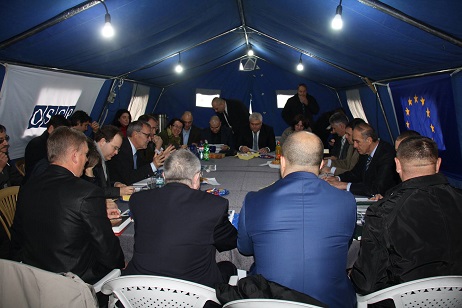Georgia and occupied Tskhinvali discuss border village issues

Conflict resolution experts have descended on the Georgian village of Ergneti to discuss issues that are plaguing the troubled region following the installation of barbed wire fences in the breakaway Tskhinvali (South Ossetia) region and the detention of Georgian citizens near the occupation line.
International experts, members of the de-facto authority of Georgia's breakaway Tskhinvali and representatives of Georgia's central government gathered in Ergneti for the 50th anniversary meeting and discussed ongoing issues, including instances of detained and missing persons.
Today’s meeting, held under the Incident Prevention and Response Mechanism (IPRM), was attended by Georgia’s EU Monitoring Mission (EUMM) leader Toivo Klaar, representatives of the Analytical Department of Georgia’s Ministry of Internal Affairs and representative from occupied Tskhinvali region.
Shalva Enukidze of the Ministry of Internal Affairs said the Georgian side was concerned with three main things: barbed wire fences, security guarantees for locals living near the occupation line and their safe traffic to gather firewood for the winter.
We came to protest the installation of barbed wire fences at the Administrative Boundary Line (ABL). We also set an issue of security guarantees for people living near the ABL of the breakaway Tskhinvali region. During winter locals often travelled to this area to collect firewood,” Enukidze said.
Ensuring locals’ safe movement on this territory was also discussed at the meeting.
We also raised the issue about two missing Georgian men. Their whereabouts are not known yet, but to our information, they may be on the South Ossetian-controlled territory.”
Meanwhile when it was the South Ossetian’s turn to talk, the side raised two issues at the meeting. One related to two instances of gunfire toward South Ossetian green border signs and about three men wanted in South Ossetia who were suspected to be on Georgian controlled territory.
When discussing the security situation along the occupation line, the sides welcomed the effective use of the telephone hotline in facilitating information exchange and cooperation between parties.
The EUMM in Georgia reported that serious topics related to the livelihood of local communities, such as movement of cattle across the ABL, were discussed in a constructive atmosphere.
Klaar, Georgia’s EUMM leader highlighted that the meeting format was a "very effective” way to communicate and an important way to solve different problems facing the local population who lived in Georgia’s breakaway Tskhinvali region.
Klaar said he wanted similar meetings to be held in Georgia’s other breakaway region Abkhazia, after meetings ceased about five years ago.
Conflict resolution meetings were held in Chuburkhinji village in the Gali region between Georgia, Abkhazian, Russia and United Nations (UN) since 1997. The EUMM was included into the meetings in 2009. But in April 2012, the Abkhaz side foiled the 36th meeting and negotiations in this format ceased with Abkhazia.
The Abkhazian side blamed the then head of EUMM Georgia Andjei Tishkevich for his "pro Georgian position” and declared him as a "persona non-grata” (an unwelcome person).
The IPRM was created in February 2009 as a result of the Geneva Discussions that followed the 2008 Russia-Georgia conflict in Georgia. The meetings were an opportunity to identify and discuss potential risks and follow-up of incidents and issues affecting the communities on a daily basis. The meetings were co-facilitated by the OSCE and the EUMM in Georgia.
 Tweet
Tweet  Share
Share